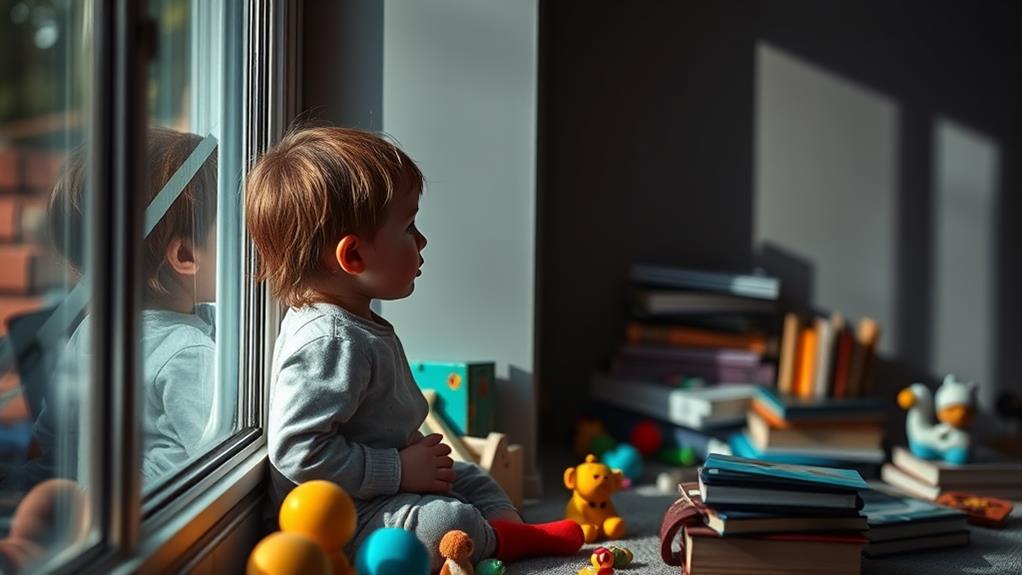You might have noticed certain traits in only children that set them apart from their peers. Characteristics like heightened independence and a preference for deep relationships with adults often emerge, leading to a unique developmental experience. While these traits can foster creativity and strong verbal skills, they can also manifest as emotional sensitivity and difficulties in sharing. As you consider these qualities, think about how they shape the behavior and interactions of only children. What other insights might these characteristics reveal about their social dynamics and self-perception?
High Self-Sufficiency

One notable characteristic of only children is their high self-sufficiency. You've probably noticed this trait in yourself or your only-child friends. It's like you've been trained to handle things on your own. When you face challenges, you don't wait around for help; you leap right in! Whether it's tackling homework or figuring out a tricky video game level, you rely on your own skills and creativity.
Being self-sufficient means you're independent, and that's a superpower! You learn to entertain yourself, too. While others might turn to siblings for fun, you've got an impressive knack for finding ways to stay busy. You might immerse yourself in books, get crafty, or create your own adventures.
Plus, you've probably developed a strong sense of responsibility. You know how to set goals and work hard to achieve them.
Of course, this independence can sometimes lead to a bit of loneliness. But don't worry; it's all part of the package. Embracing your self-sufficiency helps you grow into a confident and capable person.
Intense Imagination
How does being an only child fuel your imagination? Well, without siblings around, you often find yourself creating your own adventures. You might invent fantastic worlds where you're a superhero, a wizard, or even a dragon tamer! Since there aren't any siblings to play with, you rely on your creativity to fill that space. You can turn a simple cardboard box into a spaceship or a castle, and no one's stopping you!
Your mind becomes a playground where anything is possible. You create stories and characters, and you might even talk to them, giving them distinct personalities. This intense imagination can lead to some pretty wild ideas, and let's be honest, it's a lot of fun.
Having all that time to yourself means you can dive deep into your thoughts. You can explore feelings and dreams that spark your creativity. Sometimes, your imagination is so vivid that it blurs the line between reality and fantasy.
But that's okay! Embracing your wild ideas can make life more exciting. So, go ahead and let your imagination run wild; who knows what amazing stories are waiting to be told?
Preference for Solitude

With a rich imagination often comes a strong preference for solitude. You might find that spending time alone feels more comfortable and enjoyable than being in a large group. This isn't a bad thing! In fact, it often means you can dive deep into your thoughts, explore new ideas, or create amazing stories in your mind. Isn't it great to have that freedom?
When you're alone, you can choose how to spend your time. You can read your favorite book, draw, or even daydream about adventures. This preference for solitude helps you recharge and think without distractions.
While some kids thrive in busy environments, you might just find the quiet moments more fulfilling.
Don't worry, though! Being an only child doesn't mean you don't like people. You just enjoy your own company sometimes. Plus, your imagination lets you create friends in your mind or dream up fun scenarios.
Strong Verbal Skills
Strong verbal skills often emerge in only children due to their unique upbringing. Without siblings around to chatter with, you might find yourself engaging in more conversations with adults. This can lead to a rich vocabulary and a knack for expressing ideas clearly. You learn to articulate your thoughts, which helps you become a great storyteller.
Since you often play alone, you also create imaginary friends and elaborate scenarios. This imaginative play can boost your language skills, letting you practice speaking and storytelling all on your own.
Plus, with attentive parents, you get plenty of opportunities to discuss your interests, ask questions, and even debate topics with them.
You might notice that you're often good at explaining things to others. When friends come to you for help with homework or just to chat, you can break down complex ideas in a way that makes sense.
Your strong verbal skills can create connections, helping you build friendships. So, embrace those skills! They're not just a sign of being an only child; they're a tool you can use to express yourself and connect with people in amazing ways.
Difficulty Sharing

This struggle often comes from not having siblings to practice sharing with. When you grow up in a household where you're the only kid, the concept of sharing can feel foreign.
You might worry about what'll happen if you let someone else take a turn. Will they break your toy? Or worse, will they like it more than you do?
It's all about learning and growing. Sharing can be tough, but it's also a skill you can develop. Start small—share a snack or a game with a friend.
You'll see that sharing can actually be fun! Plus, when you let others in, you might find new ways to enjoy your favorite things. Who knows? Sharing could lead to even more adventures!
Overly Critical of Themselves
Because you often grow up without siblings to share the spotlight, you might find yourself being overly critical of your own achievements and shortcomings.
You've probably heard that little voice in your head, judging every move you make. "Was that speech good enough?" or "Why did I mess up that math test?" It's easy to get caught up in your thoughts and feel like you're never quite good enough.
This self-criticism can come from wanting to be perfect, especially since there's no one else around to compete with. You want to impress your parents and prove you're worthy of all that attention.
But guess what? Everyone makes mistakes! Learning to let go of those harsh judgments can help you feel more relaxed and confident.
Try celebrating even the small wins, like doing well on a quiz or helping a friend. It's important to remember that everyone has ups and downs.
Instead of dwelling on what didn't go right, focus on what you did achieve. After all, you're doing great just by being you!
Advanced Problem-Solving

One key trait often seen in only children is advanced problem-solving skills. Because you've often played alone, you've learned to think creatively and find solutions independently. When faced with a challenge, you're like a little detective, piecing together clues and figuring out the best way to tackle the problem.
You've got the ability to see things from different angles, which helps a lot when it comes to finding answers. For example, if your toy breaks, instead of just complaining, you might try to fix it with tape or even invent a new way to play with it. This resourcefulness is impressive!
Since you usually don't have siblings to bounce ideas off of, you've developed a knack for brainstorming on your own. You're not just a problem-solver; you're a creative thinker!
Plus, when you stumble upon a tough situation, you don't panic. Instead, you take a deep breath, gather your thoughts, and tackle it head-on.
Deep Relationships With Adults
As an only child, you often find yourself forming deep relationships with adults. It makes sense, right? Without siblings around, you naturally seek companionship elsewhere. You might connect with parents, family friends, or even teachers. These adults can become your go-to confidants, someone you feel comfortable sharing your thoughts and dreams with.
You probably notice that these relationships feel special. You might chat about everything from school projects to your favorite movies. Adults often appreciate your mature perspectives, and they listen to you in ways that can sometimes feel more genuine than with peers. Plus, you can learn a lot from their experiences, which can help you navigate life's ups and downs.
Sometimes, you might even find yourself feeling more at ease talking to adults than to kids your age. They can offer support, advice, and a sense of understanding that's hard to find in your younger peers. It's like having mini-mentors everywhere you go!
Aversion to Group Activities

While the deep connections you form with adults can be incredibly rewarding, you might also find yourself feeling less enthusiastic about group activities. You might think, "Why join a crowd when I can chat with my favorite grown-up?" It's natural to prefer one-on-one conversations or small gatherings. Large groups can feel overwhelming, like trying to swim in a pool of jelly.
You may notice that you often avoid team sports or group projects at school. The thought of sharing ideas with several people might make you anxious. Instead, you thrive in settings where your voice is heard without competition. Walking into a room filled with classmates can feel like jumping into the deep end of a pool when you just want to dip your toes in.
Sometimes, it's just easier to stick to what you know—like hanging out with a close friend or family member. You enjoy the comfort of familiar faces and engaging conversations.
Emotional Sensitivity
Feeling deeply can be both a gift and a challenge for those with Only Child Syndrome. You might find yourself more emotionally sensitive than others, picking up on feelings and vibes in a room. This sensitivity can be a superpower; it helps you connect with people on a deeper level. But, it can also feel overwhelming at times.
You might notice that you get upset more easily or feel hurt by comments that others brush off. When someone says something that stings, it can linger in your mind like a catchy song. Plus, you might worry about others' feelings, sometimes to the point where you forget to take care of yourself first.
It's like having a heart that's extra tuned in, which can be a bit tricky. You might cry at movies or feel really happy for your friends, even if you're not feeling so great yourself.



